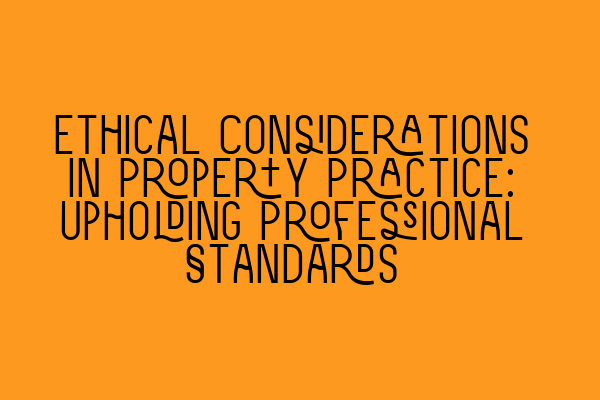Ethical Considerations in Property Practice: Upholding Professional Standards
As a solicitor practicing in property law, it is crucial to always uphold the highest professional and ethical standards. Property transactions involve significant financial investments and the potential for legal disputes, making it essential for solicitors to act with integrity, transparency, and accountability. In this article, we will explore the ethical considerations that property practitioners must carefully navigate to ensure a trustworthy and reliable legal service.
1. Duty of Confidentiality
Confidentiality is a fundamental ethical principle in the legal profession. Solicitors must maintain the strictest level of confidentiality when handling sensitive client information. This includes personal details, financial records, and any other confidential documents. By safeguarding client information, solicitors build trust and create a secure environment for clients to share their concerns.
2. Conflict of Interest
One of the most critical ethical considerations in property practice is the avoidance of conflicts of interest. Solicitors must refrain from representing multiple clients who have conflicting interests in the same property transaction. Such conflicts can compromise a solicitor’s ability to provide objective and unbiased advice. To address potential conflicts of interest, solicitors should conduct thorough conflict checks before accepting new clients or cases.
3. Honesty and Transparency
Integrity should be at the forefront of every property solicitor’s professional conduct. It is vital to be honest and transparent with clients, providing accurate and complete information about their legal matters. This includes disclosing all relevant details, potential risks, and any fees or costs involved. By being open and transparent, solicitors enable clients to make informed decisions and build long-term trust.
4. Competence and Continuing Professional Development (CPD)
Property law is a complex and ever-evolving field. Solicitors have a professional duty to maintain their competence and stay updated on legal developments through continuing professional development (CPD). By engaging in ongoing learning and training, property practitioners ensure they provide clients with accurate advice and stay abreast of any changes in legislation or regulations.
5. Avoidance of Unlawful Activities
Property solicitors must always act within the bounds of the law and avoid any involvement in unlawful activities. It is crucial to refuse instructions that may be illegal or unethical, even if pressured by clients or colleagues. Upholding the law is a core responsibility of solicitors and contributes to the overall trust and reputation of the legal profession.
6. Improper Influence and Undue Pressure
Solicitors should be mindful of avoiding any situation where improper influence or undue pressure is exerted on clients. This can include avoiding transactions where clients are forced into unfavorable agreements or coerced by others. By acting in the best interests of their clients and advocating for their rights, property solicitors help ensure fair and equitable outcomes.
In conclusion, ethical considerations play a vital role in property practice, allowing solicitors to uphold professional standards and provide reliable legal services. By maintaining the duty of confidentiality, avoiding conflicts of interest, being honest and transparent, staying competent through CPD, adhering to the law, and protecting clients from improper influences, property solicitors contribute to a trustworthy legal system.
For further insights into related topics, you may find the following articles helpful:
– Interactive SQE Mock Tests for Contract Law: Test Your Knowledge
– Contract Law Reforms: An Analysis of Recent Changes
– Parties in a Contract: Rights and Responsibilities
– The Importance of Ethics in Contract Law: A Comprehensive Guide
– Unveiling Duress and Undue Influence in Contracts
By integrating ethical principles into property practice, solicitors can ensure the trust and confidence of their clients while contributing to the overall integrity of the legal profession.
